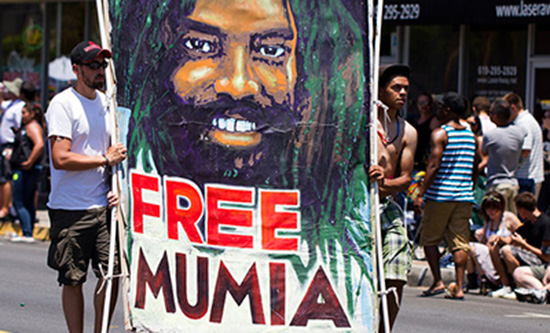
Mumia Abu Jamal, an award-winning author, journalist and political prisoner has been behind bars for 42 years. Known as the voice of the voiceless, he was framed for killing a policeman in 1981 in a trial drenched in racism. His real ‘crime’ is being unwaveringly outspoken against the oppressive capitalist system and imperialism. In Philadelphia, where Mumia is incarcerated, black people are detained at a rate nine times higher than white residents. Mumia was originally given a death sentence; in 2011 this was commuted to a life sentence without parole. Even off death row, his life remains in the balance with deteriorating chronic health issues and inadequate health care provisions.
Mumia’s case is tragically not unique and there are many political prisoners who remain behind bars after decades of imprisonment across the US, including Leonard Peltier, the US’s longest term indigenous political prisoner, who has been incarcerated for 47 years. Many of them were locked up because of their involvement with the Black Panther Party and Black Liberation Army in the 1960s and 1970s. The US state has never forgiven them for their revolutionary activism and continues to use them as an example to deter others from following their lead. Mumia talks about these indefinite sentences as a slow death sentence and campaigners are now referring to them as ‘death by incarceration’.
In the last three years several prominent US political prisoners have died within months of being released. The state claims they were granted compassionate release, but there is nothing compassionate about keeping elders in inhumane conditions only for them to die shortly after they finally see freedom.
- Chuck Africa, a member of the revolutionary organisation MOVE, was released in February 2020 after a four year battle with cancer. He died in September 2020.
Russell Maroon Shoatz, a member of the Black Panther Party, Black Liberation Army and founding member of the Black Unity Council, had two failed escape attempts before being released whilst suffering from cancer in October 2021. He died two months later. - Ruchell ‘Cinque’ Magee first came into the prison system at the age of 16. Radicalised in prison, he says ‘Slavery 400 years ago, slavery today. It’s the same but with a new name’. He won his freedom after 67 years in August 2023 and died only weeks later.
- Mutulu Shakur, a New Afrikan activist and member of the Black Liberation Army was released in July 2023, aged 72, after 35 years behind bars. He died of cancer less than seven months later.
Another remarkable revolutionary, Sundiata Acoli, was finally granted parole in 2022 at the age of 85. He was the oldest former Black Panther still incarcerated for his involvement in the black liberation struggle. In seeking parole he described himself as an old man ‘who now poses a threat not even to a flea, let alone public safety. My sentence is obviously too long. I am rapidly disintegrating before my family and friends’ eyes.’ Arrested along with Acoli, Assata Shakur escaped from prison and was granted political asylum in Cuba, where in contrast, she lives free from prison and in good health.
Prison has long been used as a tool to suppress radical politics, to control those brave enough to call out injustice and quell uprisings. Criminalising revolutionaries is deliberately aimed at attacking and discrediting their ideas and ostracising them from the rest of society. We must fight to end death by incarceration and to liberate all political prisoners. In fighting for Mumia, we fight for our own liberation.
Join the Free Mumia Campaign on 9 December 2023 4-8pm at Goldsmiths University to celebrate the life and works of Mumia Abu Jamal and to call for his immediate release.
Grace Kress
FIGHT RACISM! FIGHT IMPERIALISM! 297 December 2023/January 2024




